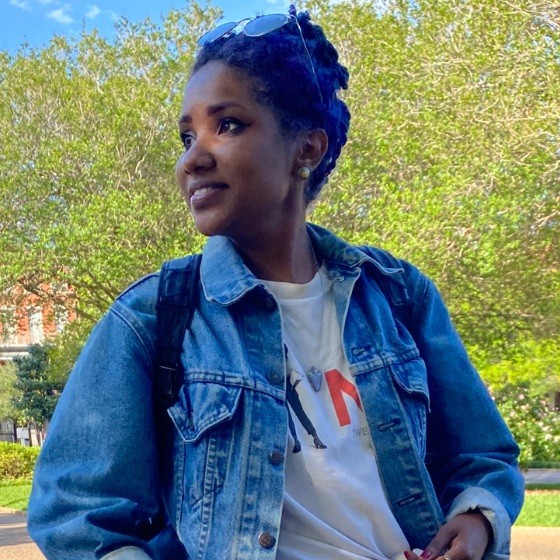As a high schooler in North Carolina, software engineer, community organizer and 2021 RealLIST Engineers honoree Dawn Wages knew she wanted to have the most attractive MySpace profile. Learning how to code just came with making sure that happened.
“I would deck out my profile and fix up my friends’ profiles,” she told Technical.ly during her recent Slack AMA. “There was also a student club for Hip Hop Journalism and I created their website for them.”
Wages enjoyed learning more about coding during that time, but felt she wasn’t advanced enough, even in high school. When she learned about Adobe Dreamweaver from a classmate only to find out that she couldn’t afford the program, it was deflating.
As an undergraduate student at the University of North Carolina at Chapel Hill, Wages earned a degree in business administration and hadn’t thought about tech or web development since she was a high school student. She worked in finance following her college graduation for years before joining the Philly Python Users Group in 2015 and falling in love with tech all over again. When DjangoCon was hosted in Philadelphia in 2016, she never looked back.
Today, Wages is a Wharton School research developer, community organizer for tech meetup groups and works to support Black engineers in their growth. During a recent Slack AMA, she talked about her career, community service work and how her work as a technologist connects to who she is as a person. Check out the responses below.
Join the Technical.ly Slack###
What do you find most interesting about your current work as a software engineer and researcher?
I love process, analysis, understanding systems and replicating successful patterns in other ways. I’m most proud of AtTheRoot.dev. We’re currently working on the first Anti-Racist Ethical Source License and have joined the cohort of other amazing Ethical Licenses with ethicalsource.dev. While simultaneously working on the License, we’re also creating an Anti-Racist Software Developer Kit. We’re still in the planning phases, but we hope to adopt some of the tenets of the Python Enhancement Proposal process used by the Python Software Foundation for the maintenance and growth of our software development kit.
We also have seen co-op and community models for governance, and ways to contribute subject matter expertise that remains fun and close to the command line — tools built with React, Python, Wagtail CMS and Django.
What prompted your work on an Anti-Racist Ethical Source License and what are its implications?
In the wake of the controversy with GitHub having a government contract with I.C.E. detention facilities, GitHub’s operational support system (OSS) products were being used to support this contract. There was a huge social media upheaval about the power developers had with their intellectual property in Open Code.
Currently, there doesn’t exist a method for recourse on how to limit someone’s use of code for ethical reasons. The Free and Open Source Software (FOSS) by the Open Source Initiative and the Free Software Foundation (two organizations that have become the arbiters of what is OSS) only limits based on ways the code is used to make money — in the context of capitalism. It is an important lens, but leads to a groundswell of libertarian tech bros who want “opinions” out of their code, while maintaining an opinionated framework. The irony.
The Organization for Ethical Source was just established internationally this past year in Geneva. It has also released its 3.0 Hippocratic License that is modular and can add certain ethical components as the user wishes. It is the most enforceable version of an ethical license in existence thanks to Coraline Ehmke and the Corporate Accountability Lab.
It is important to me that as engineers, we have the power to build a world we want to live in. I believe in open code and I believe in ethics.

Dawn Wages. (Photo via Twitter)
What programming languages do you prefer to use in your work?
I’ve moved to Python and haven’t touched PHP since. JavaScript remains a language with absolute sticking power, I think because it gives you 15 different ways to do any one thing. When consulting, I really enjoyed Gatsby —a Static Site Generator with a twist — written in React. It produces very performative web apps with low overhead and a really great developer experience. The only concern I have with Gatsby is that it feels like a lot of “magic” is on the inside. In order to abstract away complexity, it hides how it’s handling things that are shown to you in Django.
Wagtail is another one of my favorite frameworks & tools and is hard to beat. Many websites are or could use a solid CMS functionality. What comes with Django out of the box, we also get to take for granted in Wagtail but with more “syntactical sugar” and lovely user features [like] the administrator feature!
I can whip up a website with vanilla JavaScript, HTML, CSS and Python and produce a very modern and useful experience that the company can update themselves. I could go more into detail about why I love using Wagtail and am on the Wagtail Core Team. The people, Torchbox, who created Wagtail, the developer experience, the community, cool features like snippets, the robust third party package library are all reasons I love Wagtail.
As for apps I use a lot, I use Linux OS, Pycharm, Trello, a pad of paper and colored pens.
What was the difference in your workflow at a corporate tech company like your former employer Lenovo and the work you do today at an educational institution?
We meet incredible intellectual rigor here at Wharton, but we recognize work-life balance [and] how we perform best when supported and our goal is to provide the best research services to our faculty — particularly in my department as support service to researching staff.
At Lenovo, we were rough and tumble. I worked for the web sales organization and in my tenure there we captured a large part of the market share in a very saturated consumer electronics market. We hustled to get those units sold. In my project manager capacity, we had programs and partnerships [using] tons of time and energy to get into the mind and desires of the consumer to position them with the best product and give them an enjoyable purchasing and post-purchase experience. In my role as an engineer, we had the latitude to bring forth new ideas on features that would make the process online slick, modern and effective.
I’m glad to be out of the sales world, because calculating success by units sold does get tough, but I’m clearly attracted to organizations with high standards and an emphasis on supporting each other as a team and I’m incredibly grateful I have that here at Wharton.
A year after George Floyd’s murder led to diversity commitments from leading tech companies, how do you believe the industry has changed?
In my work, I don’t think I get a bird’s eye view of how the industry is changing, but I can certainly say it is. I’m inspired by people like Pariss Athena, founder of the Black Tech Pipeline, Career Karma founded by Ruben Harris, People of Color in Tech (POCIT) founded by Michael Berhane, Brandwatch by Abadesi Osunsade, and Raheem AI by Brandon Anderson. They’re all looking at how tech can provide tangible value for the Black lives–in and out of the industry–in very different and complimentary ways.
I do feel the tides changing with accountability as well as money, energy shifting towards being actively cognizant of impact in regards to race and equity. I hope to be able to announce an Anti-Racist in Tech Virtual Un-Conference for Summer 2022 or Summer 2023.
There are so many anti-racist experts doing great work. I want to invest my time in holding that line. We’ve come so far and I hope to be able to continue to connect and provide tools for subject matter experts to continue the movement and disseminate knowledge.
In considering the importance of your community work to support other technologists and people interested in tech, what has compelled you to give back in such a capacity and what have you learned from the experience so far?
At this point in my journey, I’m not always comfortable leading with my personal brand. My heart and my skills immediately go to how to remedy disconnects or improve system inefficiencies. I’ve always really enjoyed learning, interpreting and aiding in others’ lofty ideas. Being a queer woman of color has given me the lens to see the universe in a beautiful, colorful and unique way.
I try to fill my life with empathy, warmth and reciprocal support and I hope to do the same for my communities. I feel like empathy is a skill that will always need to honed [and it] can be my (read: our) superpower. There is no movement if it is not truly intersectional at its core. I learn something new in every conversation, and there is a well of untapped potential around the world. I’m particularly excited about what’s coming out of the continent of Africa. Shout out to Nigerian developers who are really kicking butt in the game.
Join the Technical.ly Slack Michael Butler is a 2020-2022 corps member for Report for America, an initiative of The Groundtruth Project that pairs young journalists with local newsrooms. This position is supported by the Lenfest Institute for Journalism.
This is How I Got Here, a series where we chart the career journeys of technologists. Want to tell your story? Get in touch.
Before you go...
Please consider supporting Technical.ly to keep our independent journalism strong. Unlike most business-focused media outlets, we don’t have a paywall. Instead, we count on your personal and organizational support.
3 ways to support our work:- Contribute to the Journalism Fund. Charitable giving ensures our information remains free and accessible for residents to discover workforce programs and entrepreneurship pathways. This includes philanthropic grants and individual tax-deductible donations from readers like you.
- Use our Preferred Partners. Our directory of vetted providers offers high-quality recommendations for services our readers need, and each referral supports our journalism.
- Use our services. If you need entrepreneurs and tech leaders to buy your services, are seeking technologists to hire or want more professionals to know about your ecosystem, Technical.ly has the biggest and most engaged audience in the mid-Atlantic. We help companies tell their stories and answer big questions to meet and serve our community.
Join our growing Slack community
Join 5,000 tech professionals and entrepreneurs in our community Slack today!

The person charged in the UnitedHealthcare CEO shooting had a ton of tech connections

From rejection to innovation: How I built a tool to beat AI hiring algorithms at their own game

Where are the country’s most vibrant tech and startup communities?



